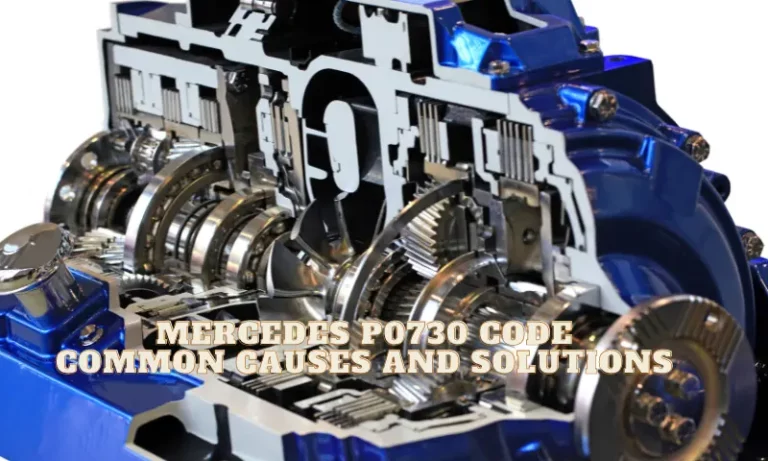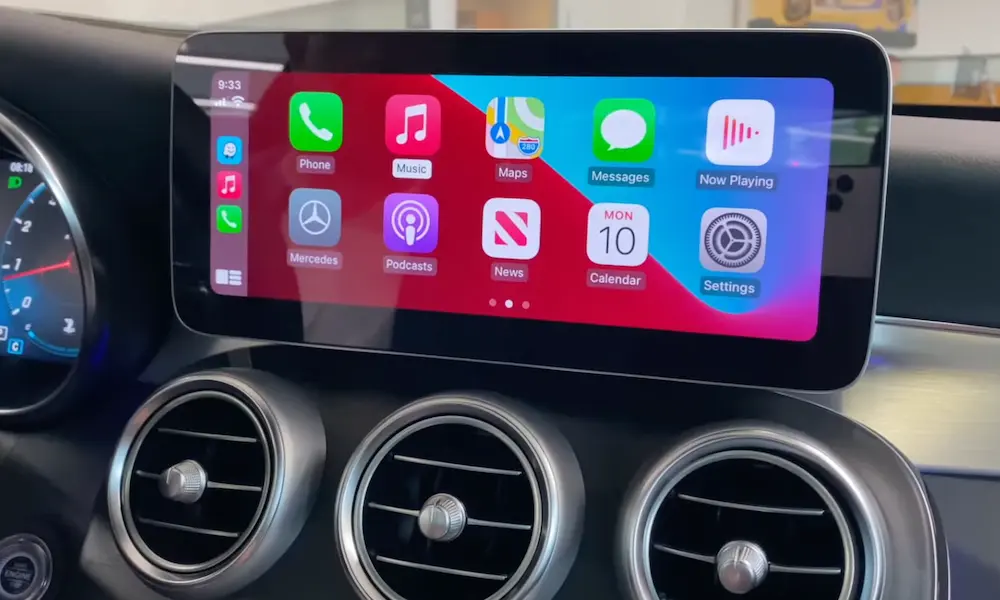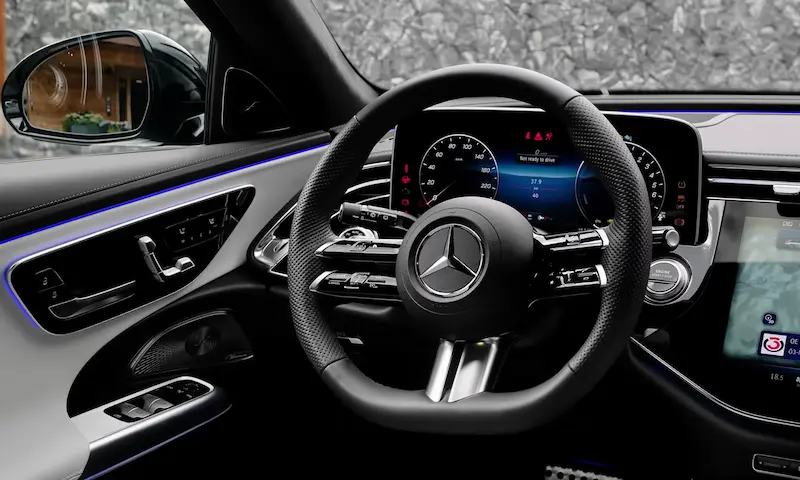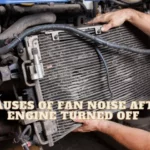If you own a Mercedes-Benz, encountering a P0730 code can be quite concerning. This code indicates an issue with the transmission’s gear ratio. In simple terms, it means your car’s transmission is not shifting into the correct gear.
There are various potential culprits behind a P0730 code, ranging from fluid leaks to faulty sensors. Understanding the possible causes can help you make informed decisions when seeking repairs or troubleshooting the problem yourself. Armed with this knowledge, you’ll be better equipped to tackle this puzzling issue head-on.
What Does Mercedes P0730 Code Mean
This code specifically stands for an Incorrect Gear Ratio or Transmission Control System Malfunction. You, as a Mercedes owner, should understand this code’s meaning and implications to ensure your vehicle’s optimal performance.
P0730 can show up when your vehicle’s transmission control module (TCM) detects an issue in any gear inside your automatic transmission. This incorrect gear ratio causes the vehicle to have problems shifting between gears, potentially affecting your driving experience.
The TCM calculates the torque converter slip ratio by monitoring the engine speed and output shaft revolution signals. If the slip ratio does not match the expected values, the TCM triggers the P0730 code to alert you of the issue.
Please note that the P0730 code definition might vary slightly depending on your vehicle’s specific make and model. As a result, it is essential to consult your vehicle’s manual or a professional mechanic for more precise information.
If you come across the P0730 code in your Mercedes, it is crucial to address the issue as soon as possible. Ignoring it may lead to more severe problems in your transmission system, which may require expensive repairs or even a complete replacement.
Symptoms of Mercedes P0730
One common sign is your vehicle’s transmission slipping. You might feel the car suddenly lose power while you’re driving, or it could struggle to move forward when shifting gears. In some cases, this can feel similar to a misfire. The CarParts blog mentions this symptom.
Another symptom you may experience is the Check Engine Light coming on. This can happen due to the P0730 code being triggered, which indicates an incorrect gear ratio in your Mercedes’ transmission. Don’t ignore the Check Engine Light when it comes on, as it can help you diagnose a potential issue with your car.
You might also notice poor fuel efficiency. This can be caused by the transmission’s inability to properly shift gears, thus using more fuel than necessary. Additionally, the car may struggle to reach higher speeds or display poor performance when accelerating.
Lastly, you could face issues with shifting gears. Your Mercedes might have delayed or erratic shifts, making driving uncomfortable and dangerous in certain situations.
Keep in mind that, like any other automotive issue, the severity of the symptoms may vary depending on the root cause of the P0730 code. Nonetheless, identifying these symptoms early on can help you address the problem and maintain the performance of your Mercedes.
Common Causes of Mercedes P0730
Transmission Fluid Issues
One of the main reasons for the P0730 code could be related to transmission fluid. It is important that you frequently check the fluid level and quality in your vehicle. Low fluid levels or dirty transmission fluid could cause the transmission to function improperly, resulting in the P0730 code. Maintaining the proper fluid level and regularly changing your transmission fluid ensures the optimal performance of your vehicle’s transmission system.
Solenoid and Sensor Problems
Another common cause of P0730 includes issues with solenoids and speed sensors. The solenoids, specifically shift solenoids, are responsible for managing the gear ratio in your transmission system. On the other hand, speed sensors detect the speed of your vehicle and send the information to the Transmission Control Module (TCM). Any malfunction in these components can trigger the P0730 code. Be sure to inspect and replace faulty solenoids or sensors as necessary to maintain your vehicle’s smooth operation.
Wiring and Connector Concerns
Wiring and connectors in the transmission system can also contribute to the P0730 code. Broken wires, corroded connectors, or damaged harnesses can hinder the transmission system’s ability to send and receive electrical signals properly. It is crucial to regularly inspect your vehicle’s wiring and connectors to minimize the chances of experiencing the P0730 code.
Transmission Control Module (TCM) Malfunctions
Lastly, the P0730 code may appear because of issues with your vehicle’s Transmission Control Module (TCM). The TCM is responsible for managing gear ratio changes and other transmission-related functions. Malfunctions in the TCM may lead to incorrect gear ratios, which trigger the P0730 code. When diagnosing this issue, keep in mind that it is important to thoroughly check your TCM, wiring, and related components before deciding on replacement or repairs.
How to Fix Mercedes P0730 Code
Inspecting the Transmission Fluid and Filter
To diagnose and fix the P0730 code for your Mercedes, start by checking the transmission fluid level. Ensure that your vehicle is parked on a level surface, and the engine has been running for a few minutes. Locate the transmission fluid dipstick, typically marked with a yellow or red handle. Clean the dipstick before reinserting it and checking the fluid level. If needed, top off the fluid with the appropriate type recommended in your owner’s manual.
Check the condition of the transmission fluid as well. If you notice a burning smell or particles in the fluid, it’s possible that the filter may be clogged or damaged. Replacing the transmission fluid and filter will not only improve your vehicle’s performance but also help prolong the life of the automatic transmission.
Checking the Solenoids and Sensors
The next step in diagnosing the P0730 code is to inspect the solenoids and sensors associated with your automatic transmission. These components are responsible for controlling the flow of transmission fluid and determining gear position. Using a diagnostic tool, check for proper operation and, if necessary, replace any faulty solenoids or sensors.
Examining the Wiring, Connectors, and Modules
Faulty wiring or loose connectors can cause the engine control module to receive incorrect signals regarding gear position. For this reason, it is crucial to examine the wiring, connectors, and modules related to your vehicle’s transmission hydraulic control circuit. Look for corrosion, broken wires, or damaged connectors that may be causing miscommunication between the gear position sensor and the transmission control module.
If you discover any issues, repair or replace the affected components. Also, inspect the wiring harness for the transmission, as it is known to cause P0730 trouble codes if damaged.
Once you have addressed these issues and ensured your transmission is functioning correctly, clear the P0730 code by using a diagnostic tool. If the code returns, consult a professional mechanic for further diagnosis and repairs, as it may indicate an internal transmission problem.
Estimating Repair Costs
When encountering a P0730 code in your Mercedes, it’s essential to get an idea of the potential repair costs. One of the primary factors is the labor rates, which vary depending on your location, vehicle’s make and model, and engine type. Most auto repair shops charge between $75 and $150 per hour.
The cost to diagnose the P0730 code is usually about 1.0 hour of labor. It’s wise to compare diagnosis prices between different repair shops to ensure you’re getting the best value. Remember that sometimes the diagnostic fee is waived if you choose to have the repairs done at the same shop.
Since the P0730 code is related to incorrect gear ratio, it may indicate a mechanical problem with your automatic transmission. Some common transmission mechanical problems include issues with the torque converter, slipping, and the torque converter slip ratio. Depending on the severity of the issue, repair costs could vary significantly.
If you suspect your vehicle’s automatic transmission is experiencing mechanical problems, ensure to take it to a reputable repair shop. They can diagnose the issue properly and provide you with an accurate repair estimate.
It’s also worth checking if there are any safety recalls related to your vehicle’s transmission. Automotive manufacturers occasionally issue safety recalls for specific components of a car, including transmissions. If your vehicle is subject to a safety recall, the problem could be fixed free of charge by the manufacturer.
Ultimately, estimating repair costs for a P0730 code involves considering labor rates, diagnosis fees, and the nature of the transmission mechanical problem. Be sure to compare prices between different repair shops and don’t forget to check for safety recalls to ensure you’re making the most informed decision for your vehicle.












